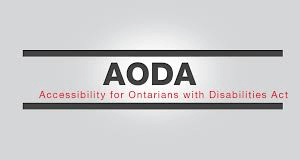David Lepofsky —
Premier Kathleen Wynne has just violated her written pledge to never reduce any protections or provisions that 1.8 million Ontarians with disabilities had won in or under Ontario’s accessibility law, the Accessibility for Ontarians with Disabilities Act (AODA). When running for Ontario Liberal Leadership, she chose December 3, 2012, the International Day for People with Disabilities, to pledge in writing that if she became Liberal Leader and Ontario Premier, she would fully maintain and not “weaken or reduce any provisions or protections in that legislation or regulations enacted under them, or any policies, practices, strategies or initiatives of or within the Ontario Government that exist to implement them or achieve their objectives…” A link to her December 3, 2012 letter is available at http://www.aodaalliance.org/strong-effective-aoda/12032012.asp
In breach of that pledge, the Wynne Government yesterday significantly weakened a core provision of the 2007 Customer Service Accessibility Standard, the first accessibility regulation ever enacted under the Accessibility for Ontarians with Disabilities Act. Ontario’s disability community tenaciously fought for a decade to get the AODA passed.
The 2007 Customer Service Accessibility Standard’ central requirement is that public and private sector organizations that provide customer service to the public must establish a policy on ensuring accessibility of their Customer Service to people with disabilities, and must train their staff on this policy. Until now, any private sector organization with at least 20 employees had to make sure it had that accessible Customer Service policy in writing, had to make it available to the public on request and had to keep a record of its employee training.
But as of yesterday, the Wynne Government gutted that requirement for the huge number of private sector organizations with 20-49 employees. They no longer need to have the policy in writing, no longer need to provide it in writing to the public on request and no longer need to keep records of its employee training on it
“This will make the core part of this accessibility regulation very hard if not impossible for the Wynne Government to effectively enforce for the great number of private sector organizations with 20-49 employees. The Wynne Government’s main way of enforcing, in the paltry fraction of cases where it has done any enforcement at all, has been by the Government auditing an organization’s paper records. Yet if a private sector organization with 20-49 employees no longer needs to keep any paper records, there’s nothing for the Government to audit,” said David Lepofsky, chair of the non-partisan AODA Alliance which leads Ontario’s grassroots campaign for accessibility for people with disabilities. “If a Government auditor asks if a private sector organization with 20-49 employees has the required policy on accessible Customer Service, the owner can just point to their head and say: ‘It’s in here!’“
The AODA requires the Ontario Government to lead Ontario to full accessibility for 1.8 million people with a physical, mental, sensory, intellectual, or learning disability by 2025. It aims to ensure that people with disabilities can fully take part in schools, universities, jobs, housing, goods, services, restaurants and stores. Under the AODA, the Government must enact and effectively enforce accessibility standards that tell public and private sector organizations what disability barriers they must tear down, and by when.
Making this situation worse for Ontarians with disabilities, yesterday’s further weakening of the possibility for enforcing Ontario’s accessibility law comes after the Wynne Government has a sorry history of poor enforcement, despite having promised that this law would be effectively enforced. The Wynne Government has known for three years of rampant private sector violations of the Disabilities Act, and of the Government’s paltry efforts at enforcement, which it cut back even further last year. Now it rewards private sector organizations with 20-49 employees that have violated the law for the past three years, by making meaningful Government enforcement even more unlikely.
Back on November 18, 2013, the AODA Alliance revealed through a Freedom of Information application that the Wynne Government knew that fully 70% of private sector organizations with at least 20 employees were violating the Disabilities Act. Two years later, on December 3, 2015, the AODA Alliance revealed that the Government knew that fully 65% of private sector organizations with at least 20 employees still had not e-filed mandatory accessibility reports that were due in 2012. Fifty-eight percent of those organizations had still not filed compliance reports that were due at the end of 2014.
“Despite Wynne Government promises one year ago to increase Disabilities Act audits this year, we have seen no indication that this has happened. The Government won’t answer our Freedom of Information inquiries about it’s enforcement plans unless we pay $4,250. As of last December Ontario still had a paltry three Disabilities Act directors and one inspector appointed to deploy the AODA’s inspection and auditing powers for the entire province.
In yesterday’s amendments, the Wynne Government made a few minor improvements to the Customer Service Accessibility Standard. For those modest measures, the Government deserves some credit. Yet those changes won’t offset this breach of the Premier’s word to people with disabilities or significantly improve the accessibility of customer service to people with disabilities.
Making Yesterday’s amendments worse still, the Wynne Government has to date refused to make any of the low-cost high-impact changes to the 2007 Customer Service Accessibility Standard that the AODA Alliance and the ARCH Disability Law Centre have requested, after consulting the disability community. For example, the Wynne Government refused to revise the Customer Service Accessibility Standard to require any organizations, even large, well-resourced and highly profitable ones, to merely put Braille and large print signs on their public bathroom doors, or to require that a retail store simply put its “point of sale” device on a cable long enough to reach down to a customer in a wheelchair. They have refused to require any organizations, even huge ones, to let customers with disabilities know on request where the nearest accessible parking spot or bathroom might be.
In 2014, a major Government-appointed Independent Review of the AODA by former Law Dean Mayo Moran found that the Government, including Premier Wynne, must now breathe new life into the AODA, and show strong new leadership on accessibility. It found that after a decade, the AODA hasn’t lived up to its great potential. It has not yet made a significant difference in the lives of Ontarians with disabilities. Ontario was not then on schedule for full accessibility by 2025, the deadline the AODA requires.
The Moran 2014 Independent Review of the AODA called on Premier Wynne to show new leadership on accessibility. “Ontarians with disabilities need Premier Wynne to keep and not break her promise to us. We call on her to suspend the changes she made yesterday that weaken protections in the Customer Service Accessibility Standard, and that broke her pledge to people with disabilities. We need her to instead enact changes to the Customer Service Accessibility Standard that will make a real difference, like ones we put on the table to discuss with her Government,” said Lepofsky “We need her to bring together representatives of the disability community, the private sector and other stakeholders, to seek a consensus on ways to meaningfully improve the 2007 Customer Service Accessibility Standard, as we have been asking and asking the Government to do, without success.”
Contact: David Lepofsky aodafeedback@gmail.comTwitter: @davidlepofsky and @aodaalliance www.aodaalliance.org
Links to Key Background Information
Kathleen Wynne’s December 3, 2012 letter to the AODA Alliance is available at http://www.aodaalliance.org/strong-effective-aoda/12032012.asp
To read the list of low-cost high-impact changes to the Customer Service Accessibility Standard that the AODA Alliance and the ARCH Disability Law Centre proposed to the Wynne Government, and which the Wynne Government has entirely rejected visit http://www.aodaalliance.org/strong-effective-aoda/03182016.asp
To read the AODA Alliance’s December 3, 2015 brief to the Wynne Government showing the serious problems with the Government’s proposed revisions to the 2007 Customer Service Accessibility Standard, visit http://www.aodaalliance.org/strong-effective-aoda/12042015.asp
To read the 2014 final report of the Mayo Moran 2nd AODA Independent Review, visit http://www.aodaalliance.org/strong-effective-aoda/Final-Report-Second-Legislative-Review-of-the-AODA.docx
To read the AODA Alliance’s analysis of the final report of the Mayo Moran AODA Independent Review, visit http://www.aodaalliance.org/strong-effective-aoda/04292015.asp and http://www.aodaalliance.org/strong-effective-aoda/05012015.asp
To read the AODA Alliance’s December 2, 2015 analysis of the Government’s November 25, 2015 FOI disclosures, and to read the documents that the Government disclosed, visit http://www.aodaalliance.org/strong-effective-aoda/dec-3-2015-analysis-of-1st-batch-of-FOI-aoda-enforcement-disclosures.docx
To learn about the AODA Alliance Chair David Lepofsky’s attempts to get the Wynne Government to waive its $4,250 fee for answering all of his June 4, 2015 Freedom of Information application, visit http://www.aodaalliance.org/strong-effective-aoda/11052015.asp
To read Economic Development Minister Brad Duguid’s February 19, 2015 letter to the AODA Alliance, revealing 2015 cuts to AODA enforcement, visit http://www.aodaalliance.org/strong-effective-aoda/02252015.asp
To read the AODA Alliance’s November 18, 2013 revelation of rampant AODA violations known to the Wynne Government, visit http://www.aodaalliance.org/strong-effective-aoda/11182013.asp
The September 12, 2007 AODA Alliance analysis of the original 2007 Customer Service Accessibility Standard is available at http://www.aodaalliance.org/strong-effective-aoda/09122007.asp
The AODA Alliance’s April 4, 2015 brief to the Accessibility Standards Advisory Council on its initial proposal for revisions to the 2007 Customer Service Accessibility Standard is available at http://www.aodaalliance.org/strong-effective-aoda/04082014.asp
The Accessibility Standards Advisory Councils final proposal for amendments to the 2007 Customer Service Accessibility Standard, and the AODA Alliance’s November 12, 2014 response to those proposals, is available at http://www.aodaalliance.org/strong-effective-aoda/11122014.asp
To learn about the campaign from 2005 to the present to get the AODA effectively implemented and enforced, visit www.aodaalliance.org
 TheBulletin.ca Journal of Downtown Toronto
TheBulletin.ca Journal of Downtown Toronto

